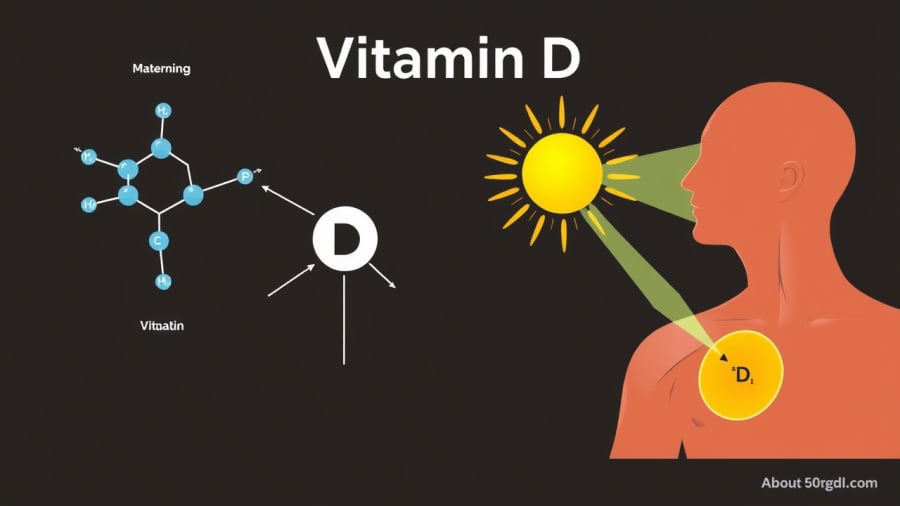The Role of Vitamin D in Maintaining Health
According to ThS.BS Tran Thi Kim Ngoc’s research, Vitamin D is an essential fat-soluble nutrient that primarily comes from external sources and plays a vital role in our body’s functioning.
Vitamin D exists in two main forms:
– Vitamin D2, also known as ergocalciferol.
– Vitamin D3, or cholecalciferol.
Both forms can be obtained through daily dietary intake. Notably, our body has the capability to synthesize Vitamin D3 through exposure to sunlight.
Vitamin D is involved in numerous important physiological functions within our body, including:
– Calcium absorption: Vitamin D enhances the absorption and metabolism of calcium in the intestines, facilitating the distribution of essential nutrients to various body parts. It also participates in the reabsorption of calcium and regulates calcium levels in the blood.
– Bone and teeth protection: As calcium is the primary component of bones and teeth, Vitamin D is essential for maintaining and ensuring a steady supply of calcium for stable bodily development.
– Hormone regulation: Vitamin D influences the production and function of insulin as well as thyroid hormones.
– Immune system boost: Vitamin D contributes to a stronger immune system, helping our body fight off pathogens like viruses and bacteria while reducing the risk of catching the flu.

Vitamin D boosts the immune system, fighting pathogens like viruses and bacteria while lowering flu risks.
Signs of Vitamin D Deficiency in Adults
According to Healthline, individuals at high risk of Vitamin D deficiency are those with minimal sun exposure. This includes people working indoors, living in areas with limited natural light, or those who excessively cover their skin when outdoors. Additionally, individuals with darker skin tones, obesity, or liver and kidney ailments are also prone to Vitamin D deficiency.
Here are some indicators that you may be lacking in Vitamin D:
Prolonged Fatigue
Feeling tired after a day’s work is normal, but if you constantly feel exhausted, even after adequate rest, it could signify a Vitamin D deficiency.
Research has shown that Vitamin D plays a crucial role in maintaining energy levels. When deficient in Vitamin D, energy metabolism is affected, leading to prolonged fatigue, weakness, and reduced concentration.
Muscle and Bone Pain
Muscle and bone pain is often a sign of Vitamin D deficiency. This condition may be mistaken for muscle strain or age-related issues. However, the distinguishing factor is that the pain caused by Vitamin D deficiency tends to be persistent and without a specific cause.
Vitamin D is crucial for calcium absorption, ensuring strong bones and muscles. A lack of this vitamin weakens the bones, leading to pain and an increased risk of osteoporosis.
Frequent Minor Illnesses and Weakened Immunity
Vitamin D is essential for activating the immune system, enabling our body to fight off bacteria and viruses. If you frequently catch the flu, suffer from prolonged coughs, or experience infections, your immune system may be compromised due to low Vitamin D levels.
Studies indicate that sufficient Vitamin D intake can reduce the risk of respiratory ailments and infections.
Excessive Hair Loss
Hair loss is a common issue with various causes, including stress, hormonal changes, chemical use, or Vitamin D deficiency. Vitamin D stimulates hair follicle growth and maintains hair strength. Insufficient Vitamin D leads to weak, brittle hair that may thin over time.
To boost Vitamin D levels, it is recommended to sunbathe for 10 to 15 minutes in the morning before 10 am to avoid harmful UV rays. Additionally, one can take supplements and consume Vitamin D-rich foods like salmon, mackerel, sardines, tuna, cod liver oil, mushrooms, and egg yolks.

Sun exposure for 10-15 minutes in the morning before 10 am is recommended to boost Vitamin D levels.
Osteoporosis
As mentioned earlier, Vitamin D is crucial for calcium absorption and bone health. Therefore, supplementing Vitamin D along with calcium optimizes absorption.
Low bone mineral density indicates a loss of calcium and other minerals from the bones, increasing the risk of fractures, especially in the elderly, particularly women. A study involving over 1,100 elderly women established a clear link between low Vitamin D levels and reduced bone mineral density.
Researchers suggest that high-dose Vitamin D supplementation not only improves bone health in deficient individuals but also serves as a viable strategy to protect bone mass and reduce fracture risks.
Muscle Pain
While muscle pain can be challenging to diagnose, Vitamin D deficiency may be a contributing factor. The pain receptors in nerve cells are highly sensitive to Vitamin D, and a lack of it can increase pain signals in the body, resulting in chronic pain. Some studies indicate that high-dose Vitamin D supplementation may alleviate various types of pain in deficient individuals.
Anxiety and Depression
According to Healthline’s research, low levels of calcidiol (a form of Vitamin D) are associated with anxiety and depressive symptoms. Specific studies also show that pregnant women with sufficient Vitamin D levels exhibit reduced anxiety, improved sleep, and lower chances of postpartum depression.
Slow Wound Healing
If you notice that wounds are healing slowly after surgery or injury, it could be a sign of inadequate Vitamin D levels. Research has shown that Vitamin D aids in producing compounds necessary for forming new epithelial tissue, an essential part of the healing process.
Vitamin D deficiency can be addressed by taking supplements, incorporating Vitamin D-rich foods into your diet, and getting sensible sun exposure. Some Vitamin D-rich foods include fatty fish, egg yolks, cereals, and yogurt. Consult your doctor before starting any supplement regimen to ensure appropriate dosage.
These were the eight warning signs of Vitamin D deficiency in adults. If you experience any of these unusual symptoms, seek medical attention promptly to get tested and receive Vitamin D supplementation as advised by your doctor.

































